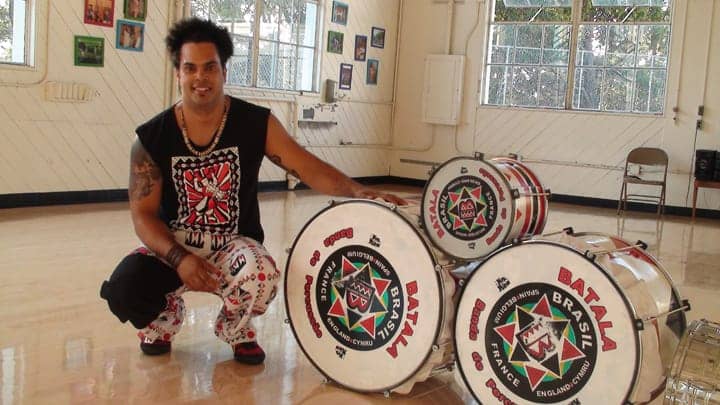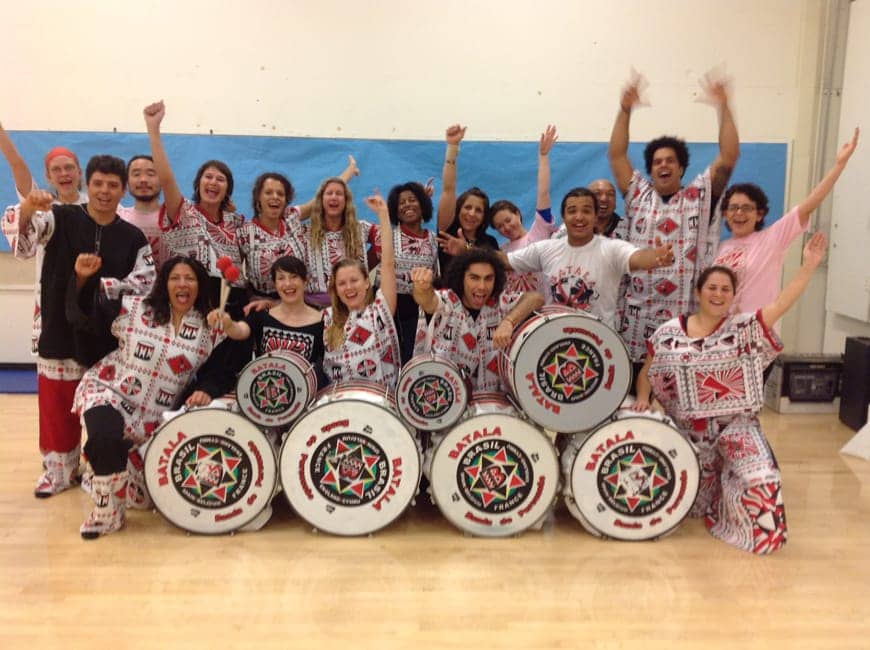by Barbara Muniz

Abel, a music aficionado who knew about Cortejo Afro, saw in the Batala origins a resonance of his own mixed Brazilian roots from Salvador. “When I saw the players with their colorful costumes, the pounding beat of their snare drum, the electric swing movements and their authenticity, it simply fascinated me!’’
He recalls: “I then contacted the organizer, who has a branch already settled in New York since 2011, and the already worldwide network of musical drummers gained the third branch in the USA, being Washington, D.C., the first one, since 2007. Apart from the U.S., and the already mentioned Paris as the origin of the group, the fans cheer worldwide – from Brazil to Spain, Wales, Portugal, Belgium, Austria, Angola and South Africa.
Although new, Batala in San Francisco already has 33 drummers. Abel had his musical debut long ago in his home town, Salvador, at the age of 11. He welcomes whoever is open to a new artistic adventure. “All these people from different backgrounds eager to learn about a culture so far away from them – it’s amazing,” he adds.
The mixed roots of Afro, Brazilian and reggae sounds show the recipe of diversity that encompasses the band. “One (tambour player) tells a friend, who in turn brings another friend. Advertising is important, but the experience that one has at the studio strapping the surdo drum around their body while flipping the sticks up in the air and hitting the colorful cylinder seems to echo more effectively than any other marketing campaign,” Abel explains. His objective is to use the fused reggae and samba rhythms also as a therapy for those who want to try something new from abroad and are willing to interact with a diverse crowd that enjoys dancing, singing and eating.

Batala is pronounced literally as the syllables show, Ba-ta-la, and its accurate meaning is unknown as there are two different accounts: Batala meaning “beat there” in the drum, or Obatala, a diety from the Afro religion Candomble, considered to be the creator of all bodies. The group is preeminent in the biggest religious event in Bahia, the Lavagem do Bonfim, which happens on the second Thursday of every January. They are also well known for playing in the famous Carnival from Bahia, where all the sister groups fly from different lands to meet for joy and festivities.
The first colonial capital of Brazil welcomes the international group from all around the globe to take part in the Lavagem do Bonfim (washing of the church), where a mix of people with diverse creeds – Afro, Christian, Orthodox – walk to the famous Catholic Church, Igreja do Bonfim, Church of the Bonfim, for praying. This event dates back to the 18th century, and it started with the slaves, later inherited by the Bahianas, a group of Bahian ladies dressed in elaborate white lace costumes – for purity purposes – with beaded necklaces, who wash the church front door steps and surroundings with scented, perfumed water, claiming them for peace, love and compassion.
The five-mile walk to the hill where the celebration takes place is done by locals, far away residents and tourists. Some of the fervent devotees make the eight-kilometer stroll on their knees to show devotion, until they reach the top of the church to pay respect. After the religious encounter, Batala and other rhythmic groups come into place, adding electric sound to the fourth most populous Brazilian state, Salvador – after Sao Paulo, Minas Gerais and Rio de Janeiro.
Event organizers, their price is negotiable and the troop’s live performances make fans wherever they go! The drummers are available for parties, shows, demonstrations, school assemblies and much more. The group meets for potluck and practice at Casa de Cultura, 1901 San Pablo Ave., Berkeley CA 94702, every Sunday from 3:30 to 6:30 p.m. Check the Facebook pages for Batala and Abel Damasceno. They are starting to get busy for the Carnival 2013, when Abel plans to bring all Batala sister bands around the world to the Bay Area.
Batala’s live performances, mixing Afro, Brazilian and reggae sounds, make fans wherever they go! The drummers are available for parties, shows, demonstrations, school assemblies and much more. They are starting to get busy for the Carnival 2013, when Abel plans to bring all Batala sister bands around the world to the Bay Area.
Abel is so emotionally imbued with music that without realizing it, he follows to a certain extent the old adage, “Do what you love and you won’t have to work again.” He lives the Brazilian-Afro-reggae tradition with respect and passion for the group as an art. As a long time percussionist himself, when he isn’t involved with the ensemble, he is doing what he loves most: feeling the musical beats!
“When I am not working toward the expansion of the group,” he says, “I am listening to music and being inspired by Batala founder Giba Goncalves. Strolling around Oakland is also relaxing and keeping physically fit and cooking keeps me happy” – healthy ways to distract the “saudade,” that homesick feeling when you’re far from home.
“I love both Bays, though,” he quickly adds, talking about his home town, Salvador, in Bahia, which means bay in English, and his other home, the Bay Area.
Barbara Muniz can be reached at barbnews@yahoo.com.





